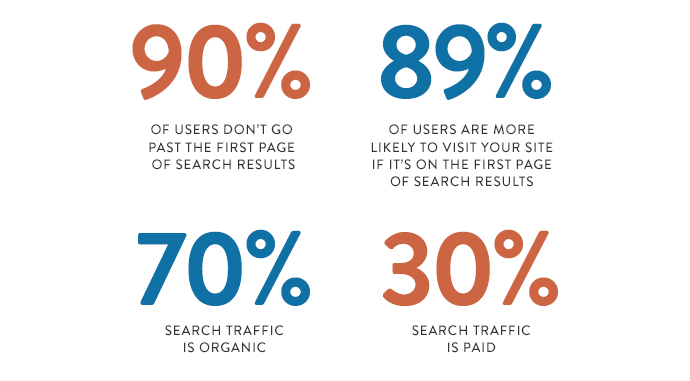SEO for Dummies: Why It Still Matters & What You Can Do About It
WANT TO SEE MORE LIKE THIS?
Sign up to receive an alert for our latest articles on design and stuff that makes you go "Hmmm?"
There has been a lot of talk recently about SEO and whether it is still current in the ever-evolving technological landscape. Is search engine optimization dead? Most definitely not! This practice has become increasingly essential to one’s website as Internet content continues to build at an exponential rate. The more websites to there are to rank, the more important it is to be on the front page of SERPs (search engine results pages). If you want a high page rank, increased website traffic, and improved visibility on content, then understanding and utilizing SEO is vital to your website and blog’s success in the ever-growing digital world.

The Basics
What is SEO? Although it sounds like fancy tech-lingo, it’s actually a very simple concept that will instantly increase your social capital at parties and kick-start your website’s traffic. SEO stands for search engine optimization, the process by which strategies, techniques, and tactics increase a website’s traffic through gaining a high ranking in the search results page of a search engine such as Google. Basically, SEO makes your site more visible on search engines. You can improve SEO through the strategies and techniques of keyword searches, page optimization, meta descriptions, content marketing strategies, and link-building both internally and externally. The higher your rank, the more likely you are to attract users to your website. SEO is the process of getting this traffic from “organic” search results, or search engine results that are unpaid and generated naturally. Through SEO you are targeting people who are already interested in your content, and this ensures greater visits, clicks, and shares of that content.
SEO’s Objectives
SEO has three basic objectives that directly influence with one another, creating a positive feedback loop that greatly benefits users, your website, and even the search engine itself! These objectives are:
- Increasing page rank on SERPs (search engine results pages)
- Targeting users organically to increase your site’s web traffic
- Improving visibility of content

It is vital to understand that these three components work synchronously. Your content will not likely be seen if your website is not on the first page of a Google search because users will be unable to “naturally” discover the site, just as a higher page rank will bring more traffic to the site and thus improve content’s visibility.
Relevance in the technological world
No one wants a website or blog that is invisible and unknown. SEO is incredibly relevant because it brings your site to the forefront of SERPs, which is the fastest way to increase traffic. Because the landscape of content on the Internet is vast and extremely cluttered – and growing exponentially each day – search engines become the easiest and most convenient way to sort through that information. Three billion plus searches are conducted on a daily basis. Of those billions of searches, 89% of people are more likely to visit your website if it is on the first page of Google, while over 90% of people do not go past the first page of search results on any search engine. These are numbers are not to be taken lightly. It is crucial for your website to be on that first page for any sort of organic exposure, and SEO is the process by which to get there.

SEO is not just for large, business-savy websites. SEO is vital and relevant to all types of content, especially for small businesses that cannot afford paid search engine marketing. Besides the money saved, it is noteworthy that over 70% of search traffic is organic as opposed to the less than 30% paid traffic generates. This type of organic traffic brings more users to websites than any other type, accounting for 54% of all traffic generated on the Internet. Visitors from organic searches are also twice as likely to be highly engaged and visit five or more pages when compared to other channels.
One of the great benefits of SEO is its lack of expiration date: your optimized content remains relevant for as long as search engines rank pages. If you still aren’t convinced of SEO’s lasting relevancy, your competitors definitely are. Don’t leave yourself in the technological dust by remaining closed off to SEO’s copious benefits.

What to Avoid
Have you been persuaded of SEO’s life-changing abilities yet? You may want to start implementing them right away, but beware of the rookie pitfalls that undeniably come with SEO. Most mistakes come from an attempt to optimize too much. One might think that your website should focus all of its efforts on SEO to gain any traction on SERPs. But SEO is a tool to help your website, not be your website. Ultimately, it is your unique content and attractive website that will invite traffic and engage users, while SEO will just help you get a foot in the door. With this in mind, here are some things to avoid:
- Jamming every keyword into your one-sentence meta description. The meta description – a concise explanation of the webpage’s contents displayed as a preview on the SERP – has no impact on SEO itself. It is only to provide information about your site to users before they actually go to your website. If the description does not make sense or is not informative, you will receive no traffic regardless of where you are ranked on the page.
- Using only keywords in headlines. Much like the meta description, a headline should be engaging and informative. Headlines drive users to view your content and it will not be read if users are confused or uninterested.
- Putting all of your content on your homepage. The homepage should make a good impression on the user so they will want to use the site in all its complexity. It is not about forcing all of your information and disallowing further exploration.
- Adding alt text to an image. This is still debated within the SEO community, but most are now agreeing that it is becoming outdated and thus not worth the time (although still recommended for ADA compliance).
- Focusing on more pages as opposed to quality of content. Although more pages means more clicks, if your pages are lacking in real content, users will not wish to explore and leave the site quickly.
- Repeating content. Duplicate content severely damages SEO because search engines face issues of indexing, directing link metrics, and ranking pages when there are multiple versions. To avoid these issues, Google punishes a website for content that is not unique, regardless of whether or not the content is from another website or from within the website itself. It is best to avoid this problem altogether.

Simple Tips
SEO is not a difficult strategy to implement, but it does take training. Here are some tips to get you started:
- Optimize for people, and not search engines. At its most basic level, your website is engaging with real people who want an informative, interesting, and attractive site. The best sites are easy to read, easy to explore, easy to convert. These three characteristics make your website highly accessible for both people and crawlers.
- Choose keywords that are relevant to your site’s content. Integrate these keywords naturally, creating uniformity throughout your site.
- Focus on generating content over building links, although the importance of links is not to be diminished. Interesting and engaging content is what ultimately what attracts users and drives traffic.
- Implement a Social Media strategy in addition to classic SEO. Social search – the combination of SEO and Social Media – is crucial in driving users to your website. Content is highly influenced by other social networks so it is important to use it as a factor.
- Understand the importance of context – the relationship between content and the user’s needs, related pages, links, and Social Media (i.e. sharing). Successful content is not merely words on a page, but how that content relates to other features of your site.
- Start a blog! Websites with a blog get 55% more SEO traffic than websites without one because blogging is a great way to create unique new content and generate users.
- Learn Google Analytics. With the help of this amazing tool, you can measure, calculate, and control how, why, and for how long users explore your site. It is a great way to understand how users are interacting with your site and develop better SEO techniques to improve traffic.

Take your website to the next level with search engine optimization. SEO is definitely not dead, but your website may as well be if you don’t implement it as a strategy to increase page ranking, improve content visibility, and increase traffic.
Once your site is SEO-friendly, you should make sure it’s ready for all of the incoming traffic: Is the navigation clear? Does it function well? Reach out and get help on all of this and more.


